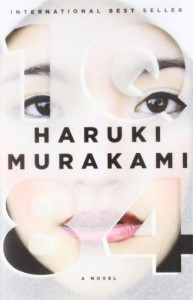1Q84
 We need to talk about Haruki
We need to talk about HarukiMy other possible title for this review was “Now I know how to quit you”. You see, I have a long, complicated relationship with Murakami. I read Wind-Up Bird Chronicle something like thirteen years ago. I devoured that book. It was weird and fun and compelling. And deeply unsatisfying. Much like his other books, the whole is far less than the sum of its parts. And yet, I keep reading more. I’m honestly not sure why, when there are so many books to read in this way-too-short life.
That decision is even more questionable with 1Q84, a 1157-page novel in three volumes, “boxed, like Proust” (apologies to Auntie Mame). I bought it on impulse from the Kinokuniya bookstore in Shinjuku, Tokyo, and early on the book, when one of the main characters stopped into the same bookstore a few times, I thought I’d made a great choice.
I could not have been more wrong. I say this without exaggeration: this is one of the worst books I’ve ever read. By way of quick synopsis, the book concerns two seemingly unconnected people in Tokyo who both stumble into intrigue involving a religious cult. Of course, it turns out that the two people knew each other, tangentially, when they were in school together at age 10. The girl was an outcast, and the boy treated her kindly once. The girl held his hand. After that, they never saw each other again, but it turns out that each has been deeply in love with the other ever since.
Except, very little happens. There are a few moments of action swimming in a sea of repetition and explanation. So much monologuing and dialoguing of exposition. So much doing the same thing over and over, describing things in the same way over and over, especially the shape of breasts and the magnificence of erections. I won’t even talk about the fantasy elements because they amount to nothing more than elaborate red herrings.
This is a one-thousand-one-hundred-fifty-seven-page shaggy dog story just for a meet cute.
That would be infuriating enough. But it’s so much worse than that.
Murakami uses an impressive battalion of rhetorical gymnastics to not only justify pedophilia but to BLAME IT ON THE GIRLS BY CLAIMING THE GIRLS WERE RAPING THE MEN. There’s a whole religious experience involved, and this completely ridiculous and unearned excuse that they’re not real, only empty vessels, and he stresses over and over and over that the men didn’t enjoy it, they hated it, they were paralyzed and couldn’t stop it, they didn’t consent, they were just used by the girls, blah blah blah YOUNG GIRLS RAPED HUGE GROWN MEN.
What kind of fucked up mind not only thinks of something like this but also thinks it’s a good idea to center a novel around it? Murakami. That’s who.
At least I won’t be wasting my time on any more of his books.
(This review was originally published as part of Cannonball Read 10.)



